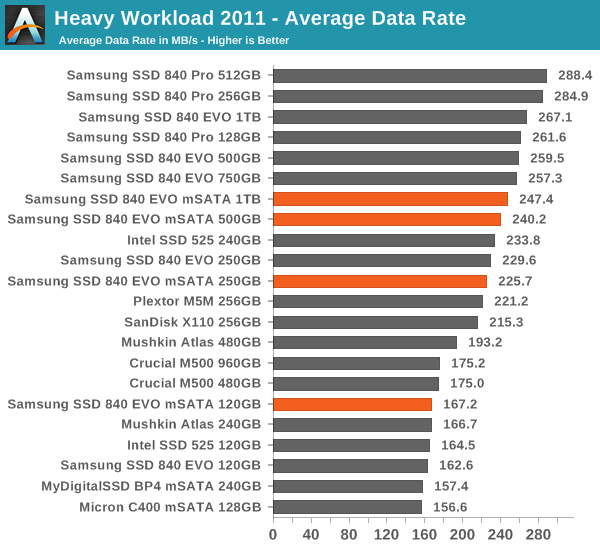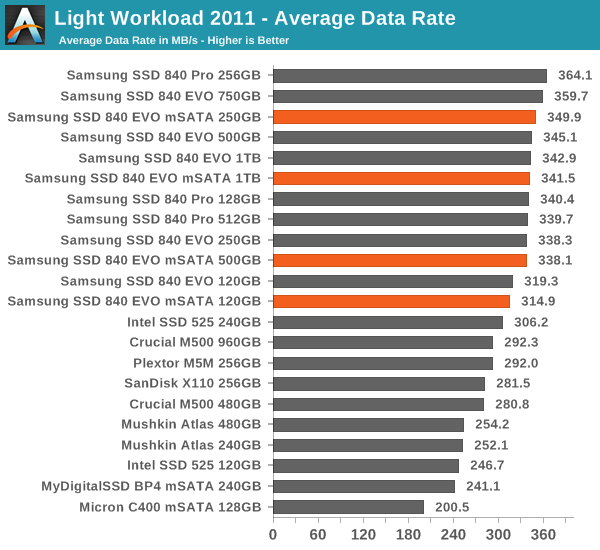Samsung SSD 840 EVO mSATA (120GB, 250GB, 500GB & 1TB) Review
by Kristian Vättö on January 9, 2014 1:35 PM ESTAnandTech Storage Bench 2011
Two years ago we introduced our AnandTech Storage Bench, a suite of benchmarks that took traces of real OS/application usage and played them back in a repeatable manner. Anand assembled the traces out of frustration with the majority of what we have today in terms of SSD benchmarks.
Although the AnandTech Storage Bench tests did a good job of characterizing SSD performance, they weren't stressful enough. All of the tests performed less than 10GB of reads/writes and typically involved only 4GB of writes specifically. That's not even enough exceed the spare area on most SSDs. Most canned SSD benchmarks don't even come close to writing a single gigabyte of data, but that doesn't mean that simply writing 4GB is acceptable.
Originally the benchmarks were kept short enough that they wouldn't be a burden to run (~30 minutes) but long enough that they were representative of what a power user might do with their system.
1) The MOASB, officially called AnandTech Storage Bench 2011 - Heavy Workload, mainly focuses on the times when your I/O activity is the highest. There is a lot of downloading and application installing that happens during the course of this test. Our thinking was that it's during application installs, file copies, downloading and multitasking with all of this that you can really notice performance differences between drives.
2) We tried to cover as many bases as possible with the software incorporated into this test. There's a lot of photo editing in Photoshop, HTML editing in Dreamweaver, web browsing, game playing/level loading (Starcraft II & WoW are both a part of the test) as well as general use stuff (application installing, virus scanning). We've included a large amount of email downloading, document creation and editing as well. To top it all off we even use Visual Studio 2008 to build Chromium during the test.
The test has 2,168,893 read operations and 1,783,447 write operations. The IO breakdown is as follows:
| AnandTech Storage Bench 2011 - Heavy Workload IO Breakdown | ||||
| IO Size | % of Total | |||
| 4KB | 28% | |||
| 16KB | 10% | |||
| 32KB | 10% | |||
| 64KB | 4% | |||
Only 42% of all operations are sequential, the rest range from pseudo to fully random (with most falling in the pseudo-random category). Average queue depth is 4.625 IOs, with 59% of operations taking place in an IO queue of 1.
AnandTech Storage Bench 2011 - Heavy Workload

The full data set including disk busy times and read/write separation can be found in our Bench.
AnandTech Storage Bench 2011 - Light Workload
Our light workload actually has more write operations than read operations. The split is as follows: 372,630 reads and 459,709 writes. The relatively close read/write ratio does better mimic a typical light workload (although even lighter workloads would be far more read centric). There's lots of web browsing, photo editing (but with a greater focus on photo consumption), video playback as well as some application installs and gaming.
The I/O breakdown is similar to the heavy workload at small IOs, however you'll notice that there are far fewer large IO transfers. Interestingly, the 480GB drive actually comes out ahead in this case, suggesting it's more capable at light workloads.
| AnandTech Storage Bench 2011 - Light Workload IO Breakdown | ||||
| IO Size | % of Total | |||
| 4KB | 27% | |||
| 16KB | 8% | |||
| 32KB | 6% | |||
| 64KB | 5% | |||











65 Comments
View All Comments
GreenThumb - Monday, February 10, 2014 - link
How would I know if a new laptop w/ Haswell processor could accept one of these drives?mdevlin - Friday, February 14, 2014 - link
One important point that was not captured in the review is thermal limiting. Our experience is that when doing large transfers (200GB+) the 1TB msata 840EVO starts to slow down and will sometimes run at 100MB/s or slower whereas we have not had this problem with the 2.5" 1TB 840 EVO. Doing a better job of cooling (even just fanning the air above a drive under test) improves mSATA performance. Not a big deal if you do not do large contiguous writes. We have never had any problem with Read performance.tomb18 - Monday, March 10, 2014 - link
Has anyone actually bought one of these 1TB drives?I have bought 2, from two different locations about 6 weeks apart. If you copy a large quantity of data (over 400gB) from another disk to one of these drives, they will fail during the write. They disappear completely, are not visible at all unless you do a reboot. Thje 500GB works fine.
I have verified this now on two different SATA3 controllers and on three different Windows 7 computers. Both 1TB drives fail on write.
RMA is in process with Samsung. I was told it sounds like a controller issue on the SSD.
mdevlin - Friday, March 14, 2014 - link
We have 6 of the 1TB mSATA drives and have no problem with large writes (up to 800GB) except the thermal issues mentioned above. With forced air cooling the performance is sustained throughout the transfer. without cooling speeds drop to less that 100MB/sec and it will actually pause and then resume (but not fail). we have had no failures after many full disk writes.mdevlin - Tuesday, April 8, 2014 - link
It seems that Samsung has updated the firmware on the 1TB mSATA 840EVO. Now when the mSATA drive overheats it throttles by alternately halting for a second, then running full bore for a second. This is less disconcerting than the previous version which would slow down for long periods or even stop for 10-20 seconds.